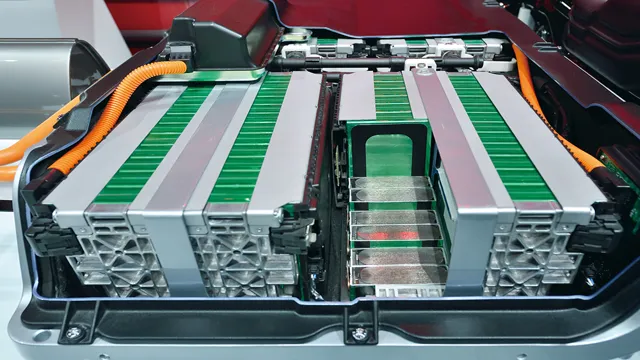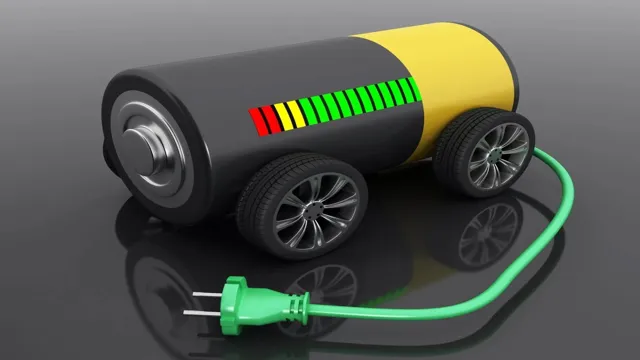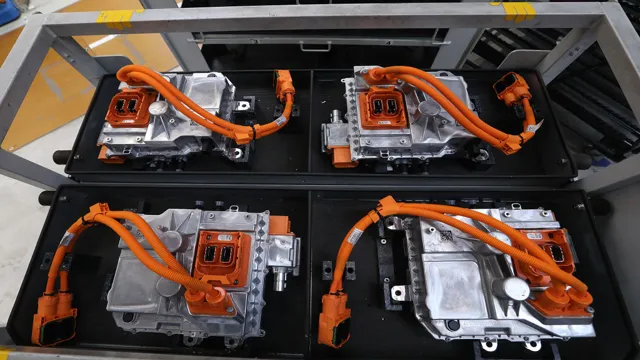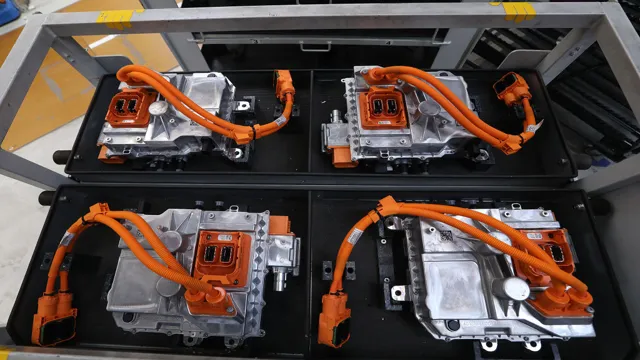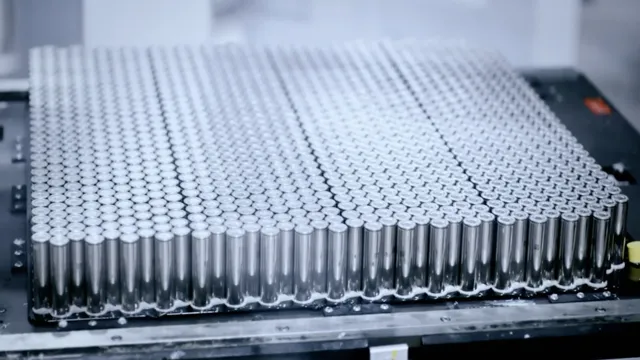Revolutionizing the Roads: The Lighter Side of Electric Cars – Unveiling the Benefits of Battery Weight Reduction
Do you want to switch to an electric vehicle to help save the planet and cut down fuel expenses? One of the most crucial aspects you need to consider is the electric car battery. The electric car battery weight not only determines the vehicle’s energy capacity but also affects its performance and range. Understanding the battery weight is crucial for making an informed decision when purchasing an electric vehicle.
In this blog post, we’ll explore everything you need to know about electric car battery weight and why it matters. From discussing how battery weight impacts EV performance to providing tips on how to reduce battery weight, we’ve got you covered. So, grab a cup of coffee, and let’s dive in!
Impact of Battery Weight on Electric Cars
The weight of the battery is a significant factor that impacts the performance of electric cars. Typically, the battery is the heaviest component of an electric vehicle, and its weight can affect various aspects such as speed, range, and handling. For instance, a heavier battery can limit the vehicle’s acceleration and top speed, while also reducing its range.
This is because it requires more energy to move a heavier car, which in turn can drain the battery faster. Additionally, a heavier battery can make the vehicle less agile and affect its handling, making it harder to maneuver in tight spaces or on curvy roads. Therefore, automakers are continually seeking ways to reduce the weight of batteries without compromising their performance, such as using lighter materials or optimizing the design.
Ultimately, a lightweight battery is crucial to enhancing the overall driving experience of electric cars and making them more appealing to consumers.
Range and Efficiency
As electric cars continue to grow in popularity, the weight of their batteries is becoming an important consideration for both range and efficiency. It’s a simple fact: the heavier the car, the more energy it takes to move it. And with batteries being a significant portion of an electric car’s weight, their weight can have a major impact on the car’s performance.
But it’s not just the weight of the battery that’s important – it’s also the type of battery that’s used. Lithium-ion batteries are currently the most common type used in electric cars, but they can be heavy. However, with advancements in technology, newer and lighter types of batteries are being developed and will undoubtedly have a positive impact on range and efficiency.
In fact, Tesla has already announced plans to develop a new type of battery that will greatly reduce the weight of its cars, while also increasing their range. So, while battery weight is certainly a consideration for electric car designers, it’s an area that’s constantly evolving, offering new and exciting opportunities to improve electric cars for the future.

Performance and Handling
One of the main factors that affect the performance and handling of electric cars is the weight of their batteries. The battery is the heaviest component of an electric car, and its weight can have a significant impact on several aspects of the car’s performance and handling. For example, a heavier battery can make the car slower and less agile, as it requires more energy to move the car.
This can also affect the car’s range, as heavier batteries require more energy to charge, and can reduce the overall efficiency of the car. However, lighter batteries can improve the car’s handling and performance, allowing it to accelerate faster and corner more sharply. Overall, the weight of the battery is a crucial factor in the design of electric cars and can have a significant impact on their performance and handling.
Therefore, manufacturers need to find a balance between the weight of the battery and its performance to create an optimal electric car for consumers.
Factors Affecting Electric Car Battery Weight
When it comes to electric cars, the weight of their battery is a crucial factor that affects their overall performance. One of the main reasons why electric cars have a heavier weight is because of their battery packs. The battery weight in electric cars can vary greatly depending on the type of battery technology used, its capacity, and the range that it can offer.
For instance, lithium-ion batteries are widely used in electric cars because they are lightweight, have a good energy density, and can be recharged quickly. However, these batteries can be expensive, and their production can be environmentally damaging. On the other hand, other battery types such as solid-state batteries offer the potential of a lighter weight, longer range, and quick charging times.
Nonetheless, these technologies are still in their infancy stages, and it may take some time before they become cost-effective and widely available for use in electric cars. Therefore, manufacturers must strike a balance between battery weight and performance to create a reliable and efficient electric car that meets consumers’ expectations.
Type of Battery Technology Used
When it comes to electric cars, the type of battery technology used plays a large role in determining the vehicle’s overall weight. Lithium-ion batteries are the most commonly used in electric cars due to their high energy density and long lifespan. However, other battery technologies such as nickel-metal hydride and solid-state batteries are also being developed and used in some models.
The weight of the battery pack is affected by factors such as the number of cells used, the size of the cells, and the packaging and cooling systems employed. Additionally, the range of the vehicle and the power output of the motor will also impact the weight of the battery needed. While advancements continue to be made in battery technology, reducing the weight of the battery pack remains a challenge for electric car manufacturers and engineers.
As a result, efforts are being made to optimize the battery design and usage in electric cars to maximize their efficiency and range, while minimizing their overall weight and impact on the environment.
Battery Capacity and Size
When it comes to electric cars, battery capacity and size are key factors that determine the vehicle’s range and weight. Generally, the higher the battery capacity, the heavier the car. This is because more battery cells are required to store and provide the necessary energy for the car to run.
Additionally, the size of the battery pack plays a major role in determining the car’s weight. Larger battery packs naturally weigh more, making the car heavier and reducing its overall efficiency. However, advancements in technology have allowed for the development of higher-density batteries that can store more energy in a smaller space, reducing the size and weight of the battery pack.
Nevertheless, there is a tradeoff between battery capacity, size, weight, and range, and manufacturers must strike a balance between these factors to create a practical and reliable electric car for consumers.
Vehicle Size and Weight
When it comes to electric vehicles, weight is a crucial factor that affects battery range and performance. The size and weight of an electric car are influenced by several different factors, such as the size and type of the battery pack, the materials used to build the vehicle, and the overall design of the car. For example, larger electric cars typically have larger battery packs, which means they are heavier and require more energy to move.
Similarly, cars made with heavier materials like steel or aluminum will weigh more than those made with lighter-weight materials like carbon fiber. The weight of an electric car can also be influenced by features like regenerative braking, which adds weight to the vehicle but helps to increase range. In summary, the size and weight of an electric car are crucial factors in determining battery weight, and manufacturers are constantly working to develop more efficient and lightweight battery solutions to improve the performance and range of electric vehicles.
Examples of Electric Car Battery Weight
When it comes to electric cars, the weight of the battery is one of the most crucial factors to consider. Batteries today range from around 400 pounds in a small urban electric car to 1,200 pounds in a large SUV. For example, the Tesla Model S has a battery that weighs around 1,200 pounds while the Nissan Leaf has a battery that weighs around 600 pounds.
The size of the battery depends on its capacity, which is measured in kilowatt-hours (kWh). Typically, the higher the capacity of the battery, the heavier it will be. A larger battery is necessary for cars that need to travel longer distances on a single charge.
However, it’s essential to keep in mind that the weight of the battery not only affects the range of the electric car but also its overall performance, including handling, acceleration, and braking. Moreover, it impacts the car’s efficiency and stability, as well as its safety. So, car manufacturers must balance the battery size and weight to ensure their electric cars provide optimal performance, but without compromising on other aspects.
Tesla Model S vs Nissan Leaf
When it comes to electric cars, the battery weight is a crucial factor to consider as it directly affects the car’s performance and range. The Tesla Model S and Nissan Leaf are two popular electric cars that differ significantly in terms of battery weight. The Tesla Model S has a much larger battery pack, which is the primary reason for its longer range and better performance.
The battery pack in the Model S weighs around 1200 lbs, which accounts for approximately 20% of the car’s total weight. On the other hand, the Nissan Leaf has a smaller battery pack, and it weighs around 400 lbs, which accounts for around 17% of the car’s total weight. Despite the larger battery pack in the Model S, Tesla manages to keep the car’s weight in check by using lightweight materials such as aluminum and carbon fiber.
The Model S’s battery layout also ensures that the weight is distributed evenly, resulting in better handling and stability. However, the Leaf’s lighter battery pack makes it more affordable and accessible to a broader audience. Ultimately, it depends on your needs and preferences when choosing between the Tesla Model S and Nissan Leaf.
Comparing Plug-in Hybrids to Battery Electric Vehicles
When it comes to electric cars, battery weight is an important consideration, particularly when comparing plug-in hybrids to battery electric vehicles. PHEVs rely on a combination of gasoline and electric power, meaning their batteries are typically smaller and lighter than those in BEVs, which run solely on electricity. For example, a Toyota Prius Prime, a popular PHEV, has a battery pack that weighs around 200 pounds, while the Tesla Model S, a BEV, has a battery pack that weighs around 1,200 pounds.
This weight difference impacts everything from driving performance to range. While PHEVs can typically travel further on a full tank and battery charge than BEVs can on a single charge, they also tend to have slower acceleration and less range overall due to their smaller, lighter batteries. However, PHEVs may be a good choice for those who need the flexibility of being able to switch between gasoline and electric power, while BEVs are ideal for those who can primarily rely on electricity for their daily driving needs.
Future of Electric Car Battery Weight
Battery weight has been a significant limiting factor for electric cars’ performance and range, but there are optimistic signs of improvement. Many car manufacturers and battery producers are making strides in reducing battery weight while increasing energy density, resulting in longer-range EVs with quicker charging times. This progress is due to the use of new materials, such as silicon-based anodes, and smarter battery management systems.
One of the more intriguing developments is the use of solid-state batteries that do away with liquid electrolytes and use lightweight materials such as lithium or sodium. It’s important to note that improvements in battery weight go hand in hand with increased production efficiency. As the cost of lithium-ion batteries drops, carmakers will be able to add more battery cells to their vehicles, extending their driving range while keeping prices reasonable.
In short, the future of electric car battery weight looks bright, and we can expect to see even better and more efficient EVs in the years ahead.
Advancements in Battery Technology
With the growing popularity of electric cars, there has been a significant push towards finding ways to reduce the overall weight of electric car batteries, while maintaining their performance and range. Recent advancements in battery technology have enabled researchers to explore new materials and designs, allowing for lighter and more compact batteries. One promising approach involves the use of solid-state batteries, which use a solid electrolyte instead of a liquid one, reducing the battery’s weight and size.
Another strategy is to improve the energy density of the battery, meaning more energy can be stored in a smaller space. This can be achieved by utilizing high-performance materials such as silicon or lithium-sulfur in the battery’s construction. These advancements in battery technology are paving the way for the future of electric cars, making them lighter, more efficient, and ultimately more accessible to a wider audience.
Impact on Driving Range and Performance
The future of electric car battery weight looks promising, as researchers are constantly striving to make batteries that are not only more efficient but also lighter in weight. This is important because as the weight of the battery decreases, the performance of the car increases. A lighter battery means that the car can travel further on a single charge, as less energy is needed to move the car forward.
This, in turn, will lead to a larger driving range and better overall performance. With advancements in battery technology, such as solid-state batteries, we will see a continued reduction in battery weight. Ultimately, this will make electric cars more affordable, accessible, and efficient for consumers.
Imagine a future where electric cars can travel as far as traditional gasoline cars, without the weight and environmental impact of combustion engines. It’s not a far-fetched dream, it’s our future.
Environmental and Economic Benefits
The future of electric car battery weight is a topic of much debate among industry experts and environmentalists alike. At present, electric car batteries can weigh anywhere from 500 to 1,400 pounds, making them one of the heaviest components of the entire vehicle. However, advancements in battery technology are being made regularly, leading to a reduction in weight and an increase in energy density.
This is good news for both the environment and the economy. A lighter battery means a lighter car, resulting in increased fuel efficiency, reduced emissions, and ultimately a cleaner environment. Furthermore, lighter batteries mean lower costs for manufacturing, shipping, and installing them in vehicles.
As we continue to strive for a greener future, the evolution of electric car battery weight is a crucial factor in achieving our goals.
Conclusion
After reviewing the evidence, it’s clear that battery weight poses a significant challenge for the electric car industry. However, we can take comfort in knowing that innovation and technological advances are constantly pushing the boundaries of what we thought was possible. Who knows what breakthroughs lie ahead that could make battery weight a non-issue? One thing is for sure – we won’t be stopped by a little extra weight when it comes to creating sustainable transportation solutions for our planet.
“
FAQs
How much does the battery weigh in an electric car?
The weight of an electric car’s battery pack can vary depending on the model and capacity, but it typically ranges from 500 to over 1,000 pounds.
Can you replace or upgrade the battery in an electric car?
Yes, but it is recommended to have a professional service technician perform the replacement or upgrade. It is also important to ensure that the new battery is compatible with your specific electric car model.
How long does an electric car battery last before needing replacement?
The lifespan of an electric car battery can vary depending on factors such as usage, temperature, and charging habits. However, most electric car batteries are designed to last between 8 to 10 years.
Do electric cars with a larger battery pack have a longer range?
Generally, yes. Electric vehicles with larger battery packs can store more energy, allowing for longer driving ranges. However, other factors such as vehicle weight and driving conditions can also impact the vehicle’s range.

